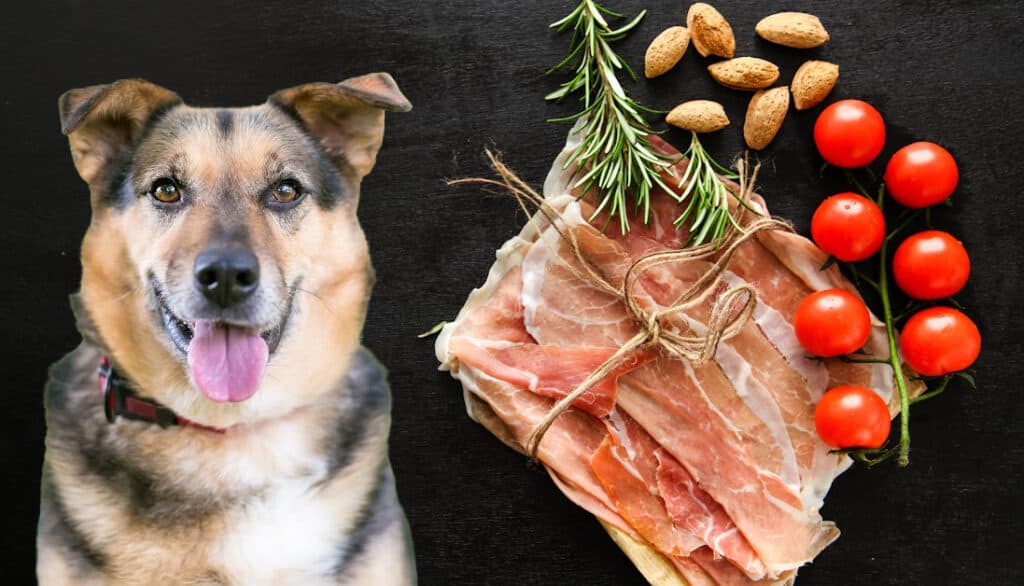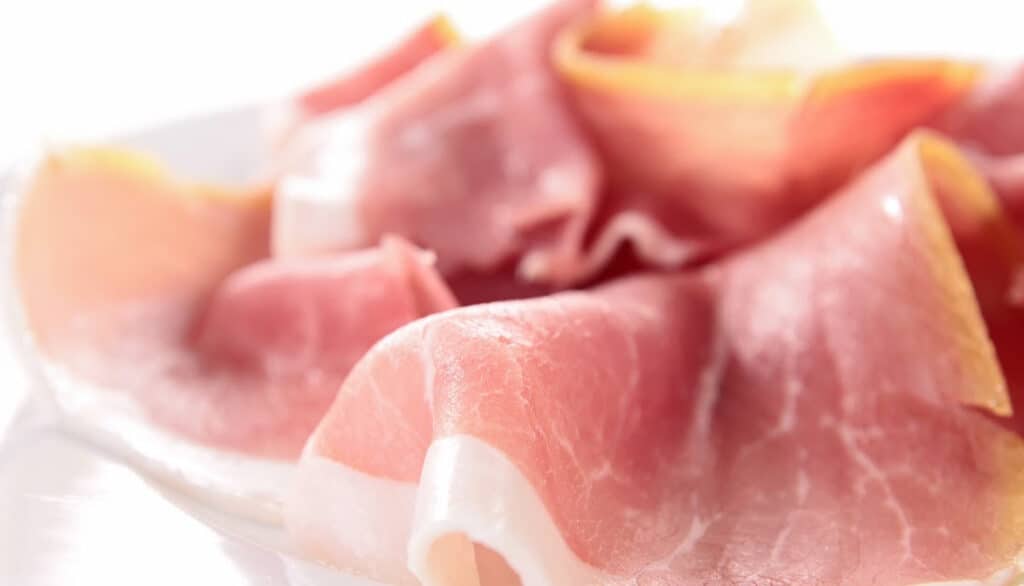The Popular Delicacy and Your Furry Friend
Prosciutto is a dry-cured ham that originates from Italy. It is a popular delicacy enjoyed by many people worldwide, often served as an appetizer or topping for pizza and pasta dishes. Have you ever wondered “Can dogs eat prosciutto?” The short answer is no, dogs should not eat prosciutto.
The salty taste and tender texture of prosciutto make it a favorite for many foodies out there. When it comes to our furry friends, dogs are no exception to the love of meat.
Many pet parents want to share their food with their furry companions, but can dogs eat prosciutto? Many dog owners who like to share the occasional treat with their pets enjoy Prosciutto, a popular lunchtime snack.
However, just because your dog likes something doesn’t mean it’s always safe for them to eat. In this comprehensive guide, we’ll take a closer look at whether or not dogs can eat prosciutto, what factors you should consider before feeding it to them, and alternative healthy meat options that are safe for your furry friend.

Overview of Prosciutto
Prosciutto is a type of ham that is made using only two ingredients: pork leg and salt. It undergoes a lengthy curing process that involves salt drying the ham for several months depending on its size and thickness.
The curing process causes the fat in the pork leg to break down into monounsaturated fats which make up most of the final product’s nutritional value. The longer it cures, the better-quality prosciutto becomes.
There are two main types of prosciutto available – San Daniele Proscuitto from Northern Italy and Parma Ham from Central Italy.
The unique flavor profile of each is based on various factors, such as the seasons when they are cured and the humidity levels in the specific regions where they are made.
Prosciutto as a Delicacy
Many parts of the world, including Italy, consider Prosciutto a delicacy that is associated with wealth and luxury. People often serve it thinly sliced and eat it either alone or with bread and cheese.
In recent years, prosciutto has become increasingly popular in other countries such as the United States, where it’s used as an ingredient in various dishes. Some people even use it to wrap fruits like melons or figs to create unique flavor combinations.
However, despite its popularity among humans, you should be careful when deciding whether or not to feed it to your furry friend. In the next section, we’ll explore whether dogs can eat prosciutto and what factors you should consider before giving them this treat.

What is Prosciutto?
Definition and Origin of Prosciutto
Prosciutto is an Italian cured meat that is made from the hind leg of a pig. It is usually aged for at least a year before it’s sold, giving it a distinct salty and savory flavor. The name “prosciutto” comes from the Latin word “perexsuctum,” which means “dried” or “deprived of juice.
The earliest known mention of prosciutto dates back to ancient Rome, where it was eaten as a delicacy among nobles. However, it was during the Renaissance period that this meat gained widespread popularity throughout Italy and beyond.
Types of Prosciutto Available in the Market
There are two main types of prosciutto: prosciutto crudo and prosciutto cotto. Proscuitto crudo, also known as raw or dry-cured ham, is made without cooking or smoking the meat.
Instead, it’s salted and air-dried for several months to create its characteristic taste and texture. Some popular varieties include Proscuitto di Parma, which comes from the Parma region in Italy, and San Daniele prosciutto.
On the other hand, proscuitto cotto is cooked ham that has been boiled or steamed before being sliced. It has a softer texture than its crudo counterpart and can be eaten cold or heated up as part of a dish.
In addition to these two main types of prosciutto, there are also regional variations within Italy itself – such as Proscuitto di Modena or Proscuitto di Carpegna – each with their own unique flavor profiles. Whether you’re looking for something savory to add to your sandwich or an ingredient for your next pasta dish – there’s sure to be a prosciutto out there that’ll suit your taste buds.

Can Dogs Eat Prosciutto?
Prosciutto, the Italian cured ham, is a popular delicacy worldwide. It is a rich source of vitamins and minerals, and it’s no surprise that many dog owners wonder if their furry friends can have a taste. However, just because prosciutto is safe for humans to eat doesn’t mean dogs can eat it too.
Explanation on whether dogs can eat prosciutto or not
Dogs can technically eat prosciutto, but this does not mean that it is safe for them to consume. Prosciutto contains high levels of salt and fat that are not suitable for dogs’ digestive systems. Additionally, some variations of prosciutto may contain harmful preservatives such as nitrates or nitrites.
Therefore, feeding your dog prosciutto should be avoided unless advised by a veterinarian or animal nutritionist. It is always better to err on the side of caution when it comes to your pet’s health.
Factors to consider before feeding prosciutto to dogs
Before feeding your dog any human food, including prosciutto, several factors must be considered. Firstly, you need to assess your dog’s overall health and existing medical conditions. Some dogs may have allergies or sensitivities that could be aggravated by consuming certain foods.
Secondly, you need to consider the quality of the prosciutto you plan on giving your dog. Ensure that the meat has not been preserved using harmful chemicals such as nitrates or nitrites.
You must also take into account the portion size when giving your dog any new food item. Small amounts of lean meat may be okay for some dogs in moderation but avoid giving them large amounts at one time.

Risks associated with feeding prosciutto to dogs
Feeding your dog too much prosciutto could lead to serious health issues. The high salt and fat content in the meat can cause digestive problems, including pancreatitis and obesity, particularly in older or overweight dogs. Moreover, prosciutto may contain added seasonings or spices that could be harmful to your dog.
High levels of sodium can lead to dehydration and other conditions such as hypertension. It is important to remember that your pet’s health should always come first.
If you have any doubts about whether prosciutto is safe for your dog, consult with a veterinarian or animal nutritionist before giving it to them. While prosciutto may be palatable for dogs, it’s best to avoid feeding it to them altogether.
Instead, opt for healthier treats that are specifically formulated for dogs and approved by veterinarians. Remember that what is good for human consumption may not necessarily be good for your furry friend’s health.
Nutritional Value of Prosciutto for Dogs
Overview of the nutritional content in prosciutto
Prosciutto is a type of cured pork that is high in sodium, fat, and protein. It also contains several vitamins and minerals such as vitamin B12, zinc, and iron. However, it is important to note that prosciutto is a processed food and may contain preservatives or additives that can be harmful to dogs.
In terms of macronutrients, one ounce of prosciutto contains 5.5 grams of protein and 4.4 grams of fat. This makes it a relatively high-fat food compared to other protein sources such as chicken or turkey.

Benefits and drawbacks of feeding prosciutto to dogs
While prosciutto does contain some beneficial nutrients for dogs, such as protein and iron, the drawbacks outweigh the benefits when it comes to this particular food item. One major drawback is its high sodium content.
Dogs require a certain amount of sodium in their diet for proper bodily function but too much can lead to health problems such as dehydration and kidney damage. Prosciutto has an extremely high sodium content which can easily exceed a dog’s daily recommended intake.
Another significant disadvantage is its high fat content. Eating too much fat can lead to pancreatitis in dogs which can cause vomiting, diarrhea, loss of appetite, abdominal pain, and even death if left untreated.
Since prosciutto is a processed meat product it may also contain preservatives or additives that are toxic to dogs. These include nitrates/nitrites which are commonly used in cured meats like prosciutto; these compounds have been linked with cancer risk in both humans and animals.
While prosciutto does offer some nutritional benefits for dogs you should avoid feeding it due to its high sodium/fat content & potential for harmful additives. Instead, opt for safer and healthier protein sources such as boiled chicken or turkey.
Alternatives to Prosciutto for Dogs
A Healthy and Safe Options List
If you want to give your dog a meaty treat, there are many safe options available. Here are some healthy alternatives that your furry friend will surely love:
- Chicken – Grilled or boiled chicken is a great option for dogs as it is lean and packed with protein. It’s also an excellent source of B vitamins, phosphorus, and selenium.
- Turkey – Another lean meat option that is high in protein but low in fat. It provides essential nutrients such as vitamin B6, niacin, and zinc.
- Beef – Lean beef cuts like sirloin or round steak can be a good source of protein for dogs, but limit the amount you feed them as it can be high in calories. 4. Salmon – A rich source of omega-3 fatty acids that help promote healthy skin and coat in dogs.
Cooked salmon is easy to digest and contains essential vitamins like B12, D, and E. 5. Lamb – This meat has high levels of vitamin B12 which helps keep your dog’s nervous system healthy while also providing iron which is essential for red blood cell production.

Comparison Between Different Types of Meat Options
While all the above-listed meats have their benefits when fed sparingly to dogs, some are healthier than others due to their nutritional value.
Chicken
- Pros: Low in calories and fat; High protein content; Rich in nutrients such as B vitamins
- Cons: Can be high in cholesterol; Some chicken preparations may contain added salt or spices
Turkey
- Pros: High protein content; Low-fat content; Essential vitamins like Vitamin K
- Cons: May contain additives like sodium nitrate which can harm your dog’s health
Beef
- Pros: Rich source of Protein; Contains essential minerals such as zinc and iron.
- Cons: Too much beef can lead to obesity in dogs; Fatty cuts of beef can cause pancreatitis.
Salmon
- Pros: An excellent source of omega-3 fatty acids that help promote healthy coat and skin health.
- Cons: Can contain dangerous levels of mercury; Avoid feeding raw salmon due to the risk of parasites.
Lamb
- Pros: High levels of vitamin B12 which helps keep your dog’s nervous system healthy; Contains Iron, which is essential in red blood cell formation.
- Cons: High-fat content can lead to obesity if fed excessively.
While prosciutto may be a favorite treat for humans, it is not recommended for dogs due to its high-fat content and added preservatives. Instead, opt for safe meat alternatives like chicken, turkey, salmon or lamb.
Always consult with your veterinarian before introducing new food items into your dog’s diet. Remember that moderation is key and that a balanced diet consisting mostly of dog food supplemented by occasional treats will help maintain your pet’s overall health and wellbeing.

So, Can Dogs Eat Prosciutto?
After evaluating the factors discussed in this article, the answer to whether dogs can eat prosciutto is no. While prosciutto may be safe for human consumption, it poses several health risks to dogs.
Dogs have different dietary requirements than humans and feeding them unhealthy foods like prosciutto can lead to serious health complications. Prosciutto is high in salt and fat, which can cause digestive upset, pancreatitis, and other health issues.
Even small amounts of prosciutto can be harmful to dogs, especially if they are prone to weight gain or have pre-existing conditions like heart disease or diabetes. If you want to treat your furry friend with meat-based treats, there are several healthy alternatives available in the market that are safe for them.
You can opt for lean meats like chicken or turkey instead of fatty options like bacon or prosciutto. Vegetables like carrots and green beans also make excellent treats that are low in calories and high in vitamins.
It’s important to remember that our pets rely on us to ensure their safety and wellbeing. Feeding them a balanced diet with adequate exercise is essential for their health, happiness and longevity.

Final Thoughts
While it may be tempting to spoil your furry friend with human treats like prosciutto once in a while, it’s not worth putting their health at risk. Dogs have different nutritional needs than humans and feeding them unhealthy foods can cause serious health complications. As responsible pet owners, we must prioritize our pet’s well-being above all else.
This involves educating ourselves on what foods are safe for our pets as well as providing them with a healthy balanced diet combined with regular exercise. While the idea of sharing some tasty meat snacks with your dog may seem harmless enough at first glance; certain types of food should always be off-limits when it comes to our pets.
As much as our furry friends may beg or give us those puppy dog eyes, it’s our responsibility to ensure they are kept safe and healthy. When it comes to prosciutto, it’s definitely best to avoid feeding it to your dog and opt for healthier alternatives.
